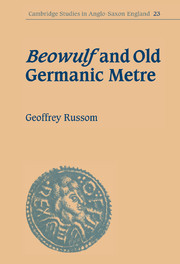Book contents
- Frontmatter
- Contents
- Preface
- List of abbreviation
- 1 Introduction
- 2 The foot
- 3 The verse
- 4 Light feet and extrametrical words
- 5 Metrical archaisms
- 6 Alliteration
- 7 Metrical subordination within the foot
- 8 Resolution
- 9 Word order and stress within the clause
- 10 Old Saxon alliterative verse
- 11 Hildebrandslied
- 12 Conclusions
- Appendix: Rule summary
- Bibliography
- Index
- Verses specially discussed
6 - Alliteration
Published online by Cambridge University Press: 02 November 2009
- Frontmatter
- Contents
- Preface
- List of abbreviation
- 1 Introduction
- 2 The foot
- 3 The verse
- 4 Light feet and extrametrical words
- 5 Metrical archaisms
- 6 Alliteration
- 7 Metrical subordination within the foot
- 8 Resolution
- 9 Word order and stress within the clause
- 10 Old Saxon alliterative verse
- 11 Hildebrandslied
- 12 Conclusions
- Appendix: Rule summary
- Bibliography
- Index
- Verses specially discussed
Summary
In native Eddie fornyrðislag, as in Beowulf, the phonological equivalence called alliteration gives special prominence to certain stressed syllables. Within a given verse, the syllable with the strongest stress is the most likely to alliterate. The second constituent of a compound, for example, never alliterates in preference to its first constituent. The concept of equivalence for alliteration derives from native-speaker intuitions about syllable structure, and corresponds to the concept of equivalence for early Germanic reduplication. In most cases, stressed syllables alliterate if they have the same initial consonant, regardless of other consonants in the onset. Thus the -r- of ON brim ‘sea’ plays no role in alliterative matching, and this word may be used to alliterate with blindr ‘blind’ or bekkr ‘bench’. However, when the onset begins with the group sp-, st-, or sk- (usually spelled sc- in the Codex Regius), both elements of the group must be matched. Thus steinn ‘stone’ alliterates with strangr ‘strong’, but not with sonr ‘son’ or spakr ‘wise’. Only consonants participate in alliterative matching. When a stressed syllable begins with a vowel, the quality of the vowel is ignored, and the empty onset is treated as a ‘zero consonant’ equivalent to any other empty onset. Thus áss ‘god’ (Øáss) alliterates with eldr ‘fire’ (Øeldr) and iorð ‘earth’ (Øiorð). Observe that the i of words like iorð (usually spelled j- in linguistic discussions) counts as a syllable-initial vowel in Eddie poetry.
- Type
- Chapter
- Information
- Beowulf and Old Germanic Metre , pp. 64 - 86Publisher: Cambridge University PressPrint publication year: 1998



